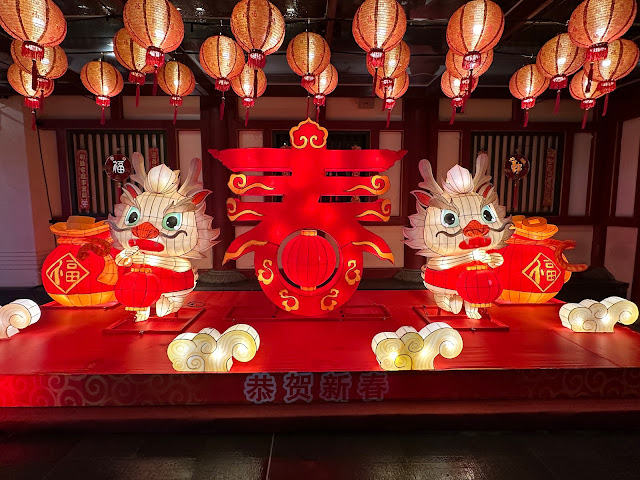新加坡 — 牛车水
Lunar New Year is a big day for the Chinese.
农历新年对华人来说是个大日子。
From the first to the fifteenth day of the Lunar New Year, some customs and taboos to share with everyone.
农历新年的初一到十五,习俗、禁忌跟大家分享一下。
It is a custom to visit relatives' homes for New Year greetings on the first day of the Lunar New Year.
正月初一到亲戚家拜年是一种习俗。
The younger generation pays respect to their elders by saying auspicious new year greetings, the elders will give red packet to the younger generation.
晚辈给长辈拜年,讲拜年吉祥话,长辈就会给晚辈红包。
Avoid killing animals and cleaning on the first day of the Lunar New Year, as this will sweep away the blessings of the new year.
正月初一当天避免杀生和打扫卫生,会把新一年的福气扫出去。
It is a traditional custom for married daughters to return to their parents' home on the second day of the Lunar New Year.
正月初二回娘家是华人的传统习俗。
In ancient times, daughters generally would not return to their parents' home easily after they got married, and it was also difficult for brothers and sisters to reunite.
在古代,女儿嫁出去了一般不会轻易回娘家,兄弟姐妹间也很难团聚。
This day is the day when sisters reunite.
这天就是姐妹团聚的日子。
Everyone sits together, stays with their parents, and exchanges feelings.
大家团坐在一起,陪在父母身边,交流感情。
Do not wash clothes on the second day of the Lunar New Year because it is the birthday of the Water God.
正月初二忌洗衣服,因为是水神生日。
Let the Water God rest well and avoid irritating the Water God.
让水神好好休息,避免惹怒水神。
On the third day of the Lunar New Year, "Red Dog" Day has the same Chinese pronunciation as "Argument".
正月初三赤狗日与赤口同音。
People usually do not go out to pay New Year greetings to avoid quarrels with others.
通常不出门拜年以避免与他人发生口角。
Welcome the Stove Lord on the fourth day of the Lunar New Year.
正月初四迎接灶王爷。
As the Stove Lord wants to count the population, so everyone should stay at home, light firecrackers, burn incense and offer fruits to welcome the Stove Lord.
因为灶王爷要清点人口,所以人人都要在家不出门,点燃鞭炮,焚香敬果迎接灶王爷的到来。
On this day, the leftovers eaten during the New Year are put together to make a hodgepodge.
这一天还要把过年来吃的剩菜合在一起,做大杂烩。
It is taboo to go to bed before 11pm on the fourth day of the Lunar New Year because the Stove Lord will count the people after 11pm.
正月初四忌讳晚上11点前入寝,因为灶王爷会在晚上11点后清点人口。
The fifth day of the Lunar New Year is the birthday of the God of Wealth.
正月初五作为财神的诞辰。
People welcome the God of Wealth to their homes on this day and hope that they will have good fortune in the new year.
人们在这一天迎接财神到家,希望自己在新的一年财运亨通。
The fifth day of the Lunar New Year is also called "breaking the fifth day", which means that after this day, all the taboos can be broken and no longer observed.
正月初五又称“破五”,是说过了这天,所有禁忌都可被打破,不再遵守了。
The sixth day of the Lunar New Year is the opening for business day, which is auspicious because of the "Six-by-Six Great Fortune".
正月初六开市大吉,因为“六六大顺”。
The seventh day of the Lunar New Year is everyone’s birthday.
正月初七是所有人的生日。
Legend has it that Nüwa created humans on the seventh day.
传说女娲第七天才造出了人。
According to tradition, seven kinds (colours) of vegetables should be eaten on this day.
按照传统,要在这天吃七种(色)菜。
The eighth day of the Lunar New Year is millet’s birthday, also called Shunxing Festival.
正月初八是谷子的生日,也叫顺星节。
It is the day when the stars descend to the lower realm, the day when the stars appear in full bloom.
是诸星下界的日子,星斗出得最全的一天。
If the weather is sunny on this day, it means a good harvest of rice this year; if it is cloudy, it means a poor harvest.
如果这天天气晴朗表示今年稻谷丰收,天阴则欠收。
The ninth day of the Lunar New Year is the "Heaven Day", which is the birthday of the Jade Emperor, so on this day you cannot dry the quilt.
正月初九这一天是“天公日”,就是玉皇大帝的生日,所以这一天不能晒被子。
Do not touch stones on the tenth day of the Lunar New Year because it is the birthday of the Stone God.
正月初十不碰石,因为是石头神的生日。
On the eleventh day of the Lunar New Year, the father-in-law invites his son-in-law to dinner, because on the second day of the Lunar New Year, the son-in-law came to his father-in-law's house with new year goodies.
正月十一这天岳父要请女婿吃饭,因为初二女婿大包小包来岳父家。
The twelfth day of the Lunar New Year, people begin to prepare for the Lantern Festival, buy lanterns and build lantern sheds.
正月十二人们就开始准备元宵, 选购灯笼、搭盖灯棚。
The thirteenth day of Lunar New Year is the "Lamp Birthday".
正月十三为“灯生日”。
On this day, a lantern is lit in the kitchen to pray for prosperity in the family and marriage for the children.
这天在厨房点盏花灯,祈求家运兴旺,为子女求得婚姻。
The fourteenth day of Lunar New Year is the birthday of Empress Linshui.
正月十四是临水娘娘诞辰。
Legend has it that Linshui Empress can subjugate demons and is the protector of women and children; pregnant women pray for a smooth delivery, and couples pray for children.
传说临水娘娘能降妖伏魔,是妇幼保护神;孕妇祈求顺产,夫妻祭拜求子。
Watch the lanterns on the fifteenth day of the Lunar New Year.
正月十五看花灯。
On the Lantern Festival, everyone comes out to watch the lanterns, guess lantern riddles, and eat dumplings.
上元节,这一天大家都出来看花灯,猜灯谜,吃元宵。
Do not borrow money from others during the Lunar New Year, and do not press for debts.
过年期间别向别人借钱,也别催债。
If you are entangled with money at the beginning of the New Year, you will have a bad year.
新年开始就被金钱纠缠,一年都会过的不顺心。
Do not cry in the Lunar New Year.
新的一年不要哭哭啼啼。
People think that if you cry in the new year, you will have bad luck in the new year.
人们认为新开始就哭哭啼啼,那新的一年也会霉运不断。
People believe that breaking bowls, cups, etc. during the Lunar New Year is unlucky.
人们相信新年打破碗、杯子等都是不吉祥的。
But if you do break something, quickly say "Peace every year."
但是如果真的打破东西,赶紧说“岁岁平安”。













No comments:
Post a Comment